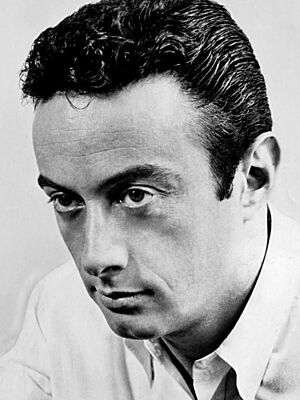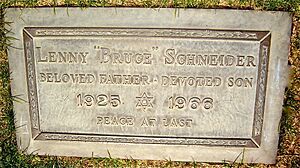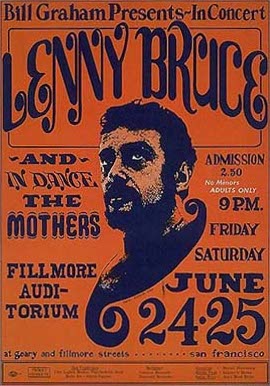Lenny Bruce facts for kids
Quick facts for kids
Lenny Bruce
|
|
|---|---|

Bruce in 1961
|
|
| Born |
Leonard Alfred Schneider
October 13, 1925 Mineola, New York, U.S.
|
| Died | August 3, 1966 (aged 40) Los Angeles, California, U.S.
|
| Resting place | Eden Memorial Park Cemetery |
| Occupation |
|
| Years active | 1947–1966 |
| Spouse(s) |
Honey Bruce
(m. 1951; div. 1957) |
| Children | 1 |
| Relatives | Sally Marr (mother) |
| Comedy career | |
| Medium | Stand-up, television, books |
| Genres |
|
| Subject(s) |
|
| Signature | |
Leonard Alfred Schneider (born October 13, 1925 – died August 3, 1966) was an American stand-up comedian. He was better known by his stage name, Lenny Bruce. He was famous for his honest and critical style of comedy. His jokes often talked about important topics like politics and religion.
Lenny Bruce helped shape comedy for a new generation of comedians. In 2017, Rolling Stone magazine named him one of the top stand-up comics ever. He was ranked third, after Richard Pryor and George Carlin.
Contents
Lenny Bruce was born Leonard Alfred Schneider in Mineola, New York. He grew up nearby in Bellmore, New York. His parents divorced when he was young. He often lived with different family members. His mother, Sally Marr, was a performer and had a big impact on his career.
At 16, Bruce joined the United States Navy in 1942. He served during World War II. He was on the USS Brooklyn (CL-40) in places like Northern Africa and Italy. In 1945, he performed a comedy show for his shipmates. After this, he was honorably discharged from the Navy.
Later, during the Korean War, Bruce worked in the United States Merchant Marine. He helped transport troops between the U.S. and Europe.
Starting a Comedy Career
After his time in the Navy, Bruce moved to New York City. He wanted to become a comedian. It was hard to stand out among many other hopeful performers. He met Joe Ancis, who greatly influenced his comedy style. Bruce became known for his sharp humor and for questioning common ideas.
In 1947, he changed his last name to Bruce. He got his first stand-up comedy job in Brooklyn. He earned $12 and a free spaghetti dinner. He even appeared on a radio show called Arthur Godfrey's Talent Scouts. His mother introduced him on the show.
Career Highlights and Challenges
Bruce's early career included writing movie scripts. He wrote for Dance Hall Racket (1953) and a children's film, The Rocket Man (1954). He also worked with photojournalist William Karl Thomas on screenplays and comedy albums.
In the 1950s, Bruce lived with comedian Buddy Hackett. They even performed together on Patrice Munsel Show. They called themselves the "Not Ready for Prime Time Players." This was 20 years before the cast of Saturday Night Live used the same name.
Bruce released four comedy albums. These were later put together as The Lenny Bruce Originals. He also produced and sold two of his own records. He became very popular at the hungry i nightclub in San Francisco.
Lenny Bruce often faced challenges with television appearances. He was sometimes kept off TV because of his controversial jokes. However, fans like Hugh Hefner and Steve Allen helped him appear a few times.
One of his most famous performances was at Carnegie Hall in New York City. This happened on February 4, 1961, during a big snowstorm. The show was recorded and released as The Carnegie Hall Concert.
In August 1965, Bruce gave a performance in San Francisco. He mostly talked about his struggles with authorities over his comedy. This show was filmed and later released as The Lenny Bruce Performance Film.
Personal Life
In 1951, Lenny Bruce married Honey Harlow. They moved to the West Coast and worked together as a comedy duo. Their daughter, Kathleen ("Kitty") Bruce, was born in 1955. Lenny and Honey had a complicated relationship. They divorced in 1959. At the time of his death, he was engaged to comedienne Lotus Weinstock.
Later Years and Final Performances
Lenny Bruce appeared on network television only six times in his career.
In September 1962, Bruce visited Australia. His visit caused a lot of public discussion. His first show was quiet, but his second show led to controversy. The venue owners canceled his remaining performances. University students tried to arrange another show for him, but permission was suddenly taken away. An interview he was supposed to give on Australian television was also canceled.
Bruce mostly stayed in his hotel room. Eight days later, he gave his third and final Australian concert. Only about 200 people attended, including many police officers. Bruce gave a calm performance. A recording of this show was made by a local musician and later found in 2011. It was donated to the Lenny Bruce audio collection at Brandei University.
In December 1965, Bruce gave a famous performance at the Berkeley Community Theatre. This show was recorded and became his last live album, The Berkeley Concert. People described this performance as very clear and calm. His very last performance was on June 25, 1966, at The Fillmore Auditorium in San Francisco. He performed alongside Frank Zappa and The Mothers of Invention.
Death and Legacy

Lenny Bruce was found dead in his home on August 3, 1966. He was buried at Eden Memorial Park Cemetery in Mission Hills, California. Over 500 people attended his service. His gravestone reads: "Beloved father—devoted son / Peace at last".
Lenny Bruce's life and comedy have inspired many.
- In 1974, a movie called Lenny was made about his life. It starred Dustin Hoffman, who was nominated for an Oscar for his role.
- The documentary film Lenny Bruce: Swear to Tell the Truth (1998) was also nominated for an Oscar.
- In 2004, Comedy Central ranked Bruce as the third greatest stand-up comedian of all time. Both Richard Pryor and George Carlin, who ranked higher, said Bruce greatly influenced them. Carlin even said Bruce influenced his moral thinking as much as his comedy.
Filmography
| Year | Title | Role | Notes |
|---|---|---|---|
| 1953 | Walking My Baby Back Home | Writer | Uncredited |
| Dance Hall Racket | Vincent | Directed by Phil Tucker | |
| 1954 | Dream Follies | ||
| The Rocket Man | Screenplay | Directed by Oscar Rudolph | |
| 1955 | The Leather Jacket | Actor / writer | A short film project that was not finished |
| 1959 | One Night ...: The World of Lenny Bruce | Himself / writer | TV special |
| 1967 | The Lenny Bruce Performance Film | Himself / writer | Filmed in San Francisco 1966 |
| 1971 | Thank You Mask Man | Voice of 'The Lone Ranger' / writer / director | Animated short film |
| Dynamite Chicken | Himself | Sketch comedy film | |
| 1972 | Lenny Bruce Without Tears | Himself | Documentary |
| 1974 | Lenny | Biography directed by Bob Fosse and starring Dustin Hoffman as Lenny | Hoffman was nominated for an Academy Award |
| 1984 | A Toast to Lenny Bruce | Himself | TV tribute |
| 1998 | Lenny Bruce: Swear to Tell the Truth | Himself | Academy Award nominated documentary |
| 2011 | Looking for Lenny | Himself | Documentary with interviews from other comedians |
Discography
Albums
| Year | Title | Label | Format | Notes |
|---|---|---|---|---|
| 1958 | Interviews of Our Times | Fantasy Records | LP / CD / download | |
| 1959 | The Sick Humor of Lenny Bruce | LP / CD / download | ||
| 1960 | I Am Not a Nut, Elect Me! (Togetherness) | LP / CD / download | ||
| 1961 | American | LP / CD / download | ||
| 1964 | Lenny Bruce Is Out Again | Lenny Bruce | LP / download | Live recordings |
| 1966 | Lenny Bruce Is Out Again | Philles Records | LP | Produced by Phil Spector |
Posthumous releases
| Year | Title | Label | Format | Notes |
|---|---|---|---|---|
| 1966 | Why Did Lenny Bruce Die? | Capitol Records | LP / download | Interviews and recordings |
| 1967 | Lenny Bruce | United Artists Records | LP | Recorded February 4, 1961, reissued as In Concert At Carnegie Hall |
| 1968 | The Essential Lenny Bruce Politics | Douglas Records | LP / download | Clips with historical audio |
| 1969 | The Berkeley Concert | Bizarre Records/Reprise Records | 2×LP / CD / download | Recorded December 12, 1965, produced by Frank Zappa |
| 1970 | To Is a Preposition; Come Is a Verb | Douglas Records | LP / CD / download | Recorded 1961–1964 |
| 1971 | Live at the Curran Theater | Fantasy Records | 3×LP / 2×CD / download | Recorded November 19, 1961 |
| 1972 | Carnegie Hall | United Artists Records | 3×LP / 2×CD / download | Recorded February 4, 1961, full version |
| 1974 | The Law, Language and Lenny Bruce | Warner-Spector Records | LP / cassette | Produced by Phil Spector |
| 1992 | Lenny Bruce | Rhino Entertainment | CD | Soundtrack from The Lenny Bruce Performance Film |
| 1995 | Live 1962: Busted! | Viper's Nest Records | CD / download | Recorded December 4, 1962 |
| 2004 | Let the Buyer Beware | Shout! Factory | 6×CD / book | Previously unreleased material |
Compilations
| Year | Title | Label | Format | Notes |
|---|---|---|---|---|
| 1962 | The Best Of Lenny Bruce | Fantasy Records | LP / cassette | |
| 1972 | Thank You Masked Man | LP / CD | Includes short film | |
| 1975 | The Real Lenny Bruce | 2×LP | ||
| 1982 | Unexpurgated : The Best Of Lenny Bruce | LP | ||
| 1991 | The Lenny Bruce Originals Volume 1 | CD / download | Reissue of first and second albums | |
| The Lenny Bruce Originals Volume 2 | Reissue of third and fourth albums | |||
| 2011 | Classic Album Collection | Golden Stars | 3×CD | First 4 albums with bonus tracks |
| 2013 | Great Audio Moments, Vol. 33: Lenny Bruce | Global Journey | download | 22 tracks |
| Great Audio Moments, Vol. 33: Lenny Bruce Pt. 1 | 9 tracks | |||
| Great Audio Moments, Vol. 33: Lenny Bruce Pt. 2 | 9 tracks | |||
| 2016 | Four Classic Albums Plus Bonus Tracks | Real Gone Music | 4×CD | First 4 albums with bonus tracks |
Audiobooks
| Year | Title | Label | Format | Notes |
|---|---|---|---|---|
| 2000 | Shut Your Mouth And Open Your Mind – The Rise & Reckless Fall of Lenny Bruce | Chrome Dreams | CD / download | Biography read by Robin Clifford |
| 2002 | The Trials of Lenny Bruce | Sourcebooks MediaFusion | CD / book | Features parts of Lenny's trial recordings |
| 2016 | Lenny Bruce: How to Talk ... and Influence People: An Autobiography | Hachette Audio | download / CD | Read by Ronnie Marmo |
Tribute albums
| Year | Title | Label | Format | Notes |
|---|---|---|---|---|
| 1972 | Jarl Kulle: Som Lenny Bruce – Varför Gömmer Du Dig I Häcken? | Polar Music | 2×LP | Swedish actor performing Lenny's material |
See also
 In Spanish: Lenny Bruce para niños
In Spanish: Lenny Bruce para niños
 | Selma Burke |
 | Pauline Powell Burns |
 | Frederick J. Brown |
 | Robert Blackburn |


